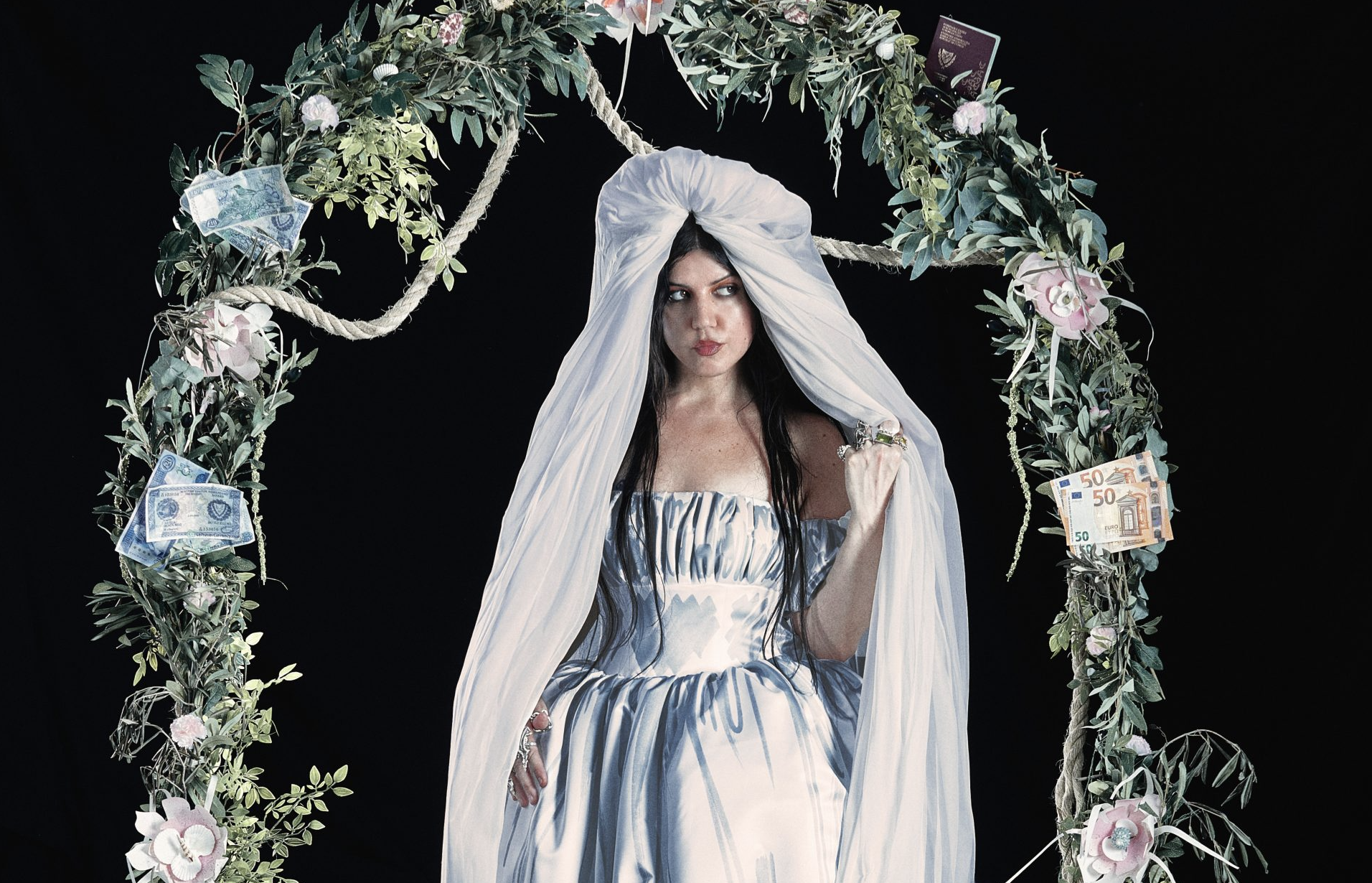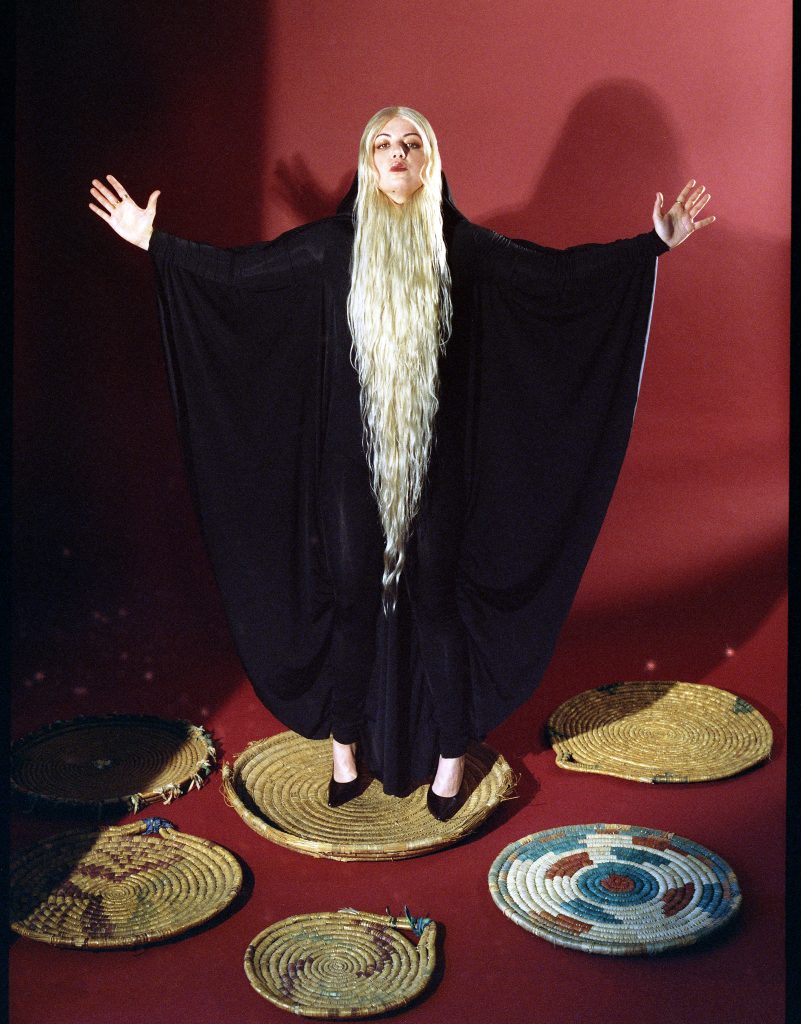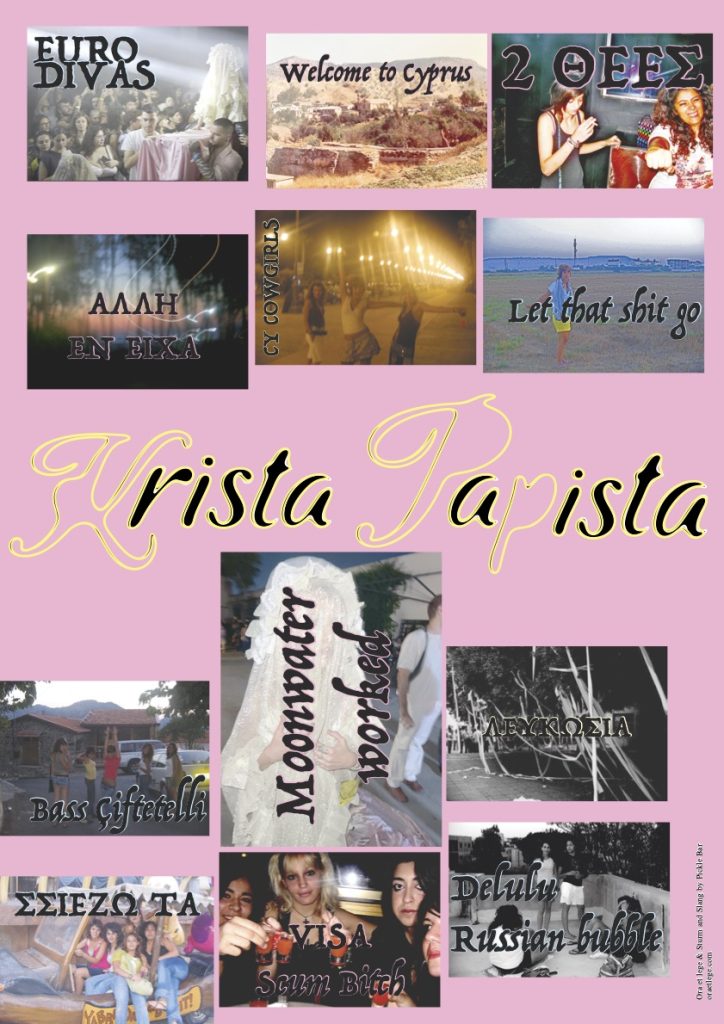Krista Papista on queering Cypriot & Balkan pop
Published March, 2025
by Lucia Udvardyova

Cyprus with its complex history and geopolitics has become a reference to be deconstructed in the work of Berlin-based Cypriot musician and performance artist Krista Papista. In July 1974 a coup d’etat was staged by Greek Cypriot nationalists and Athens’ far-right military junta, followed by a Turkish invasion a few days later. The conflict left many displaced, traumatised and uprooted and the island partitioned into EU-member state Cyprus and the Turkish Cypriot Northern Cyprus, which remains only recognised by Turkey. Papista often returns to her home, and documents present-day Cyprus in her work – its picturesque beaches, tourism and gentrification, visa schemes and “golden passports” – and attempts to “queer the politically induced Cypriot & Balkan Pop with Euro Trash EDM”.
Can you talk about your background? You are from Cyprus, currently based in Berlin. How did you get to music, what is your story?
Growing up in Nicosia, Cyprus, the education system felt like riding a fucked up motorcycle into orthodox hell. Demonstrations would happen weekly, the schools would stop and all we did during school time was crash demonstrations, chill in coffee shops or rooftops. We had endless warm sun and diamond panoramic beaches. Geographically, Cyprus borders Europe, West Asia and Africa, it was colonised and invaded by whoever had power since day one.
Cyprus has been divided since 1974, which has been caused by ethnopolitical conflict mostly between the Greek Cypriots and the Turkish Cypriot nationalists. My mother is a refugee and the Cyprus problem was a big topic during my upbringing – it still is in contemporary Cyprus. There was a lot to explore in the island’s history, the sandstone architecture and the myths connected to the ancient ruins. I still spend a lot of time back home for these reasons. At 14 I wanted to put together an all girl punk band; I met two girls online and we started playing gigs around Nicosia. We called ourselves “Collecting Trash”. At 18, I moved to London to go to art school. I started producing music on different softwares and making my first music videos – I haven’t stopped since.

You have been dealing with decontextualising your “heritage” so to speak – at least the geographical one. For instance, on your album Fucklore you “explore the ways in which the manifestation of contemporary Mediterranean, Middle Eastern and Balkan folklore and computerised, punk music, can act as subversive counterpoints to homogenous, nationalist narratives.” Could you please elaborate about your methods and motivations for doing so?
I experienced nationalism in Cyprus first hand. It started from a rightwing education that placed the main emphasis on Greek history and Orthodox Christianity. The Cypriot identity and slang are infused with shame. Shame that we are not Greek enough, or we are not European enough, there is always someone else or other forces controlling the island.
Hellenistic symbols like the Greek flag are painted on the walls and placed in the architecture and aesthetics as a holy symbol; I couldn’t help myself – in my early performances I painted a massive Greek flag with period blood – red – and threw it to the crowd to be eaten. My recent performance “She is giving geostrategic fantasy”, which consists of me being carried in silk on the shoulders of four people through a crowd or in the streets – is a re-invention of the Italian Catholic ritual “La Madonna che scappa”. It ends with a spitting ritual, where I invite the audience to spit in a bucket, releasing what they want to get rid off. Subverting rituals is my attempt to create spiritual and religious experiences in my work.
Your albums are quite narrative. Each track is a story, a world of its own. From the more global themes (such as murders of migrant women in Cyprus) to personal ones (ie on “Private link to my heart” or “5 hours of period cramps”). There’s usually a hint of irony, too. Can you talk about the story-telling aspect of your music-making?
On Fucklore most stories were biographical, some are referencing the lives of the seven migrant women Lyvia, Elena, Maricar, Mary-Rose, Sierra, Aryan & Asmitta, who were brutally murdered by an army officer in Cyprus a few years ago. I’m recently writing fictional stories that will be connected to the new album. There’s one about a queer cowgirl in North Cyprus who was born in a cave that I wrote during a recent residency in the Czech Republic.

Your videos are beautifully shot and glossy – almost like trailers to films – and often conceptual (eg the video inspired by self-help tutorials and therapy sessions entitled “Expressive therapy freak out in a Berlin car park with Krista Papista”). What role do videos play in your work?
Thank you for your kind words <3 . Films and video art have deeply inspired me. My videos capture precisely the different eras in mine and my friends’ lives. The video ΣΥΜΦΩΝΙΑ *Agreement you are talking about illustrates the Berlin I was experiencing in 2022, on that summer day, everyone hedonistically trying to peel themselves into a child-like state, through an experimental workshop we staged in Tempelhof. Ještěd Tower is a portrait of how my love life felt, Sonnenallee was shot in the area I live in. Me and my friends (Jan Verwoert, Kanella Petropoulou, Kiki Moorse), who often perform with me on stage, wore our bell costumes and run up and down the Sonnenallee avenue, performing a ritual where our bells cleanse the streets from the dark winter energies in order to welcome spring’s new ones.
Your latest video “Visa Scum Bitch” is an autobiographical story referencing modern day Cyprus, which touches upon the issue of “golden passports”, money laundering and gentrification. Can you talk about the story and how you adapted it to your music/video?
I wanted to make a video where I paint a contemporary portrait of Cyprus, through my world. Money laundering and wealthy individuals/criminals have been coming to Cyprus for years, the government created a corrupt system where one can spend around 350k buying a luxury apartment, then receive a Cypriot passport, entering the EU this way. This has caused inflation and impossible living standards for Cypriots. The majority of these individuals are Russians, who are dominating cities like Limassol, creating a phenomenon of neo-colonialism.
“VISA Scum Bitch” shares the experience of different characters in one song; the viral artist experiencing her momentum, the Delulu Russian living it up in Cyprus & the entitled ex-girlfriend that keeps showing up. In the video I receive a request from a Russian woman to play a private show in her apartment, she offers 50k and I ask for 100k. The deal is sealed and I show up with my two friends who end up robbing her house while I perform for her.
Queering Cypriot and Balkan Pop, and dealing with its political ramifications, has been at the core of your work. What ways do you utilise for this, and how do you see the position of the music from this region, as well as its re- and decontextualisation?
Cyprus is an amalgamation of many influences and cultures due to its geographical position and invasions by other cultures (British, Turkish, the Venetians, the Egyptians). You can witness this in the mythology, the architecture, the religion and the food. This amalgamation also exists in my work. I carry my background with me, I use the Cypriot slang in my writing, I use the religious rituals I grew up with. It’s my job to re-invent them and present them in a fresh and powerful way in order for us to connect and relate to them today.
Interview by Lucia Udvardyova
Photographer: Isotta Giulia Acquati
Styling: Hakan Solak
Stylist assistant : Ilia Kulishov
Make up by HYANGSOON LEE
Hair: Tina Pachta
Set Design: Carina Dewhurst
Set Design assistant : Pauline Jarosinska
Light technician: Riccardo Contrino
Jewellery @ffarji____________
Videographer: Kanella Petropoullou
Produced by Ruben Cortelletti at Chérie Agency
Studio: Studio Chérie
This article is brought to you as part of the EM GUIDE project – an initiative dedicated to empowering independent music magazines and strengthen the underground music scene in Europe. Read more about the project at emgui.de.
Funded by the European Union. Views and opinions expressed are however those of the author(s) only and do not necessarily reflect those of the European Union or the European Education and Culture Executive Agency (EACEA). Neither the European Union nor EACEA can be held responsible for them.